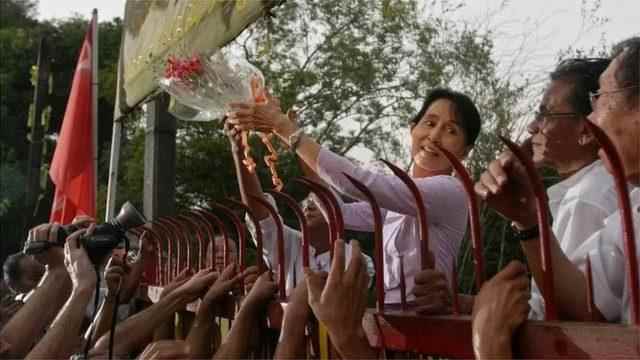Deposed leader Aung San Suu Kyi in Myanmar was sentenced to 4 years in prison on charges of illegal possession and importation of radios.
Suu Kyi, who was detained after the military coup in February 2021, denies all charges against her.
The crime attributed to Suu Kyi is thought to stem from the devices that the soldiers found as a result of searches conducted in Suu Kyi’s house right after the coup.
The hearing held today in the capital city of Nepido (Naypyitaw) was held closed to the press. Suu Kyi’s lawyers were also banned from making statements to the press.
Suu Kyi, who was awarded the Nobel Peace Prize in 1991, was found guilty of inciting the people to rebellion and violating the Covid-19 rules in December and was imprisoned for 2 years. punishment was given.
United Nations High Commissioner for Human Rights, Michelle Bachelet, described the trial in question as “fraudulent” and condemned the decision.
Human Rights Watch, on the other hand, commented that Suu Kyi would be imprisoned indefinitely due to wrongful judgments.
Phil Robertson, the organization’s chief for Asia, accused the military of “providing political convictions by setting up bogus courts”.
Robertson argued that the rights of human rights activists in the country, including Suu Kyi, are being violated.
In Myanmar, Suu Kyi’s National League for Democracy (NLD) party won the November 2020 elections, after which the military seized power in February 2021.
The army claimed that election fraud was the reason for the coup. But independent election monitors said the elections were largely free and fair.
After the coup, large-scale protests took place in the country. The military put pressure on pro-democracy protesters, activists and journalists.
According to the data of the Association for Assistance to Political Prisoners, more than 10,600 people, including Suu Kyi, who burned down since February, were arrested by the junta, and 1,303 people were killed during the demonstrations.
Suu Kyi is expected to receive a life sentence if found guilty of all charges against her.
Who is Aung San Suu Kyi?
Aung San Suu Kyi, the daughter of General Aung San, who led Myanmar’s independence struggle, lost her father as a result of assassination when she was only 2 years old.
Suu Kyi has become known as a “human rights activist” who has criticized the authoritarian rule of the military forces that ruled Myanmar for decades.
He was awarded the Nobel Peace Prize in 1991 while under house arrest. He was imprisoned for nearly 15 years between 1989 and 2010.
In November 2015, he won Myanmar’s first free election in 25 years with the NLD as leader.
However, the Myanmar constitution prevented Suu Kyi from becoming president because her children were citizens of other countries. Suu Kyi, now 76 years old, was the de facto leader of the country before the coup.
The accusations of genocide against Muslims living in the Arakan state in Myanmar became one of the most challenging topics for Suu Kyi and her administration in the international arena.
Although it is known that he has no power over the Myanmar army, the operations against Muslims negatively affected the prestige of Suu Kyi, who was awarded the Nobel Peace Prize in 1991. The United Nations (UN) described Suu Kyi as an “accomplice”.
After the attack on a police station in Myanmar in 2017, the army carried out operations in predominantly Muslim areas.
In 2018, the human rights organization Amnesty International announced that they were withdrawing the Ambassador of Conscience Award given to Aung San Suu Kyi.
Amnesty International cited that the Myanmar Army “openly persecuted” Rohingya Muslims, while Suu Kyi remained silent about what happened in her country and “betrayed” the values she had previously defended. Suu Kyi, on the other hand, said in an interview with the BBC that ethnic cleansing is not practiced against Rohingya Muslims.
In 2009, the organization awarded Suu Kyi, who was under house arrest at that time, with the Ambassador of Conscience Award, pointing out her struggle for peace and democracy in her country.
